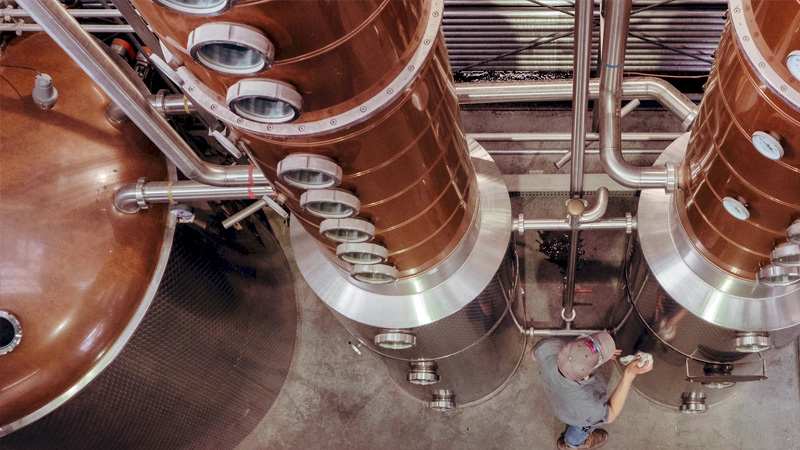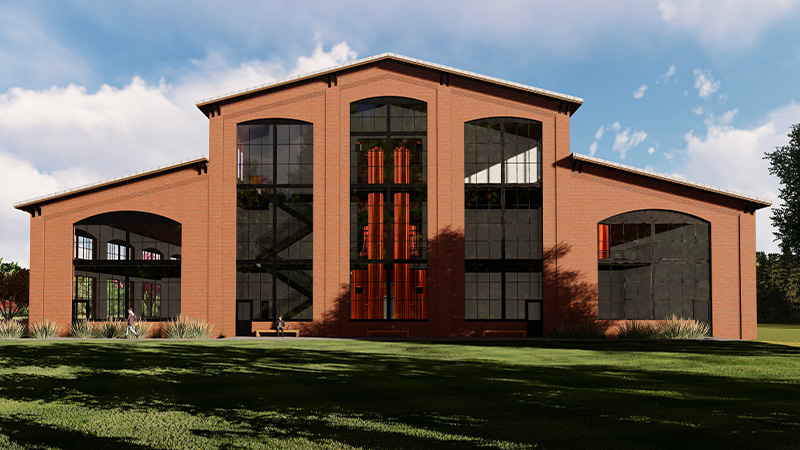Since the earliest days of American whiskey, many distilleries have provided liquid for brands other than their own. Known as contract distillation, the arrangement benefits both parties: The distillery owner gets immediate cash for services, while the contract client receives high-quality spirit, often made to their specifications, without having to assume any of the risk or upfront investment that comes with owning the means of production. And consumers benefit from more variety.
Contract whiskey has ebbed and flowed with the overall industry, but in the last decade, the practice has been bolstered by the boom in bourbon. Both existing and new distilleries are expanding their contract services at large scale. The outcome of this expansion won’t be just more bottles of whiskey for sale, but a wider array of flavors and styles — although, to be sure, there’s about to be a whole lot more whiskey, too. But is this a good thing or a bad thing for the industry?
“Sourcing Is Not a Crime”
Despite being a long-established part of American whiskey, contract production has gotten a bad rap during this century. As bourbon began its revival 15 or so years ago, many consumers didn’t understand that the majority of bottles on the shelf came from just a handful of distilleries, most of them using dba (“doing business as”) names to create the appearance that each brand had its own facility. (Anyone who’s ever tried to visit “Knob Creek Distillery” has likely realized that no such place exists; the whiskey is made at the James B. Beam Distilling Co.’s Clermont, Ky., plant.)
Don’t Miss A Drop
Get the latest in beer, wine, and cocktail culture sent straight to your inbox.
And then there were new brands, their owners buying and bottling barrels of mature whiskey from large distilleries. Some were open about it, while others didn’t clearly disclose the practice, and a handful actively lied about it. (This practice of “sourcing” — purchasing new-make or mature whiskey whose production specs have been decided by the distiller — differs from “contract distillation,” which refers to a distillery producing a custom recipe, dictated by a client, on their behalf. But the two are often conflated.)
Even the small amount of deception regarding sourced whiskey fostered a sense of suspicion among many drinkers, but it also led to a push for transparency that has blossomed: Now, any brand caught concealing the fact that it’s sourced gets excoriated on social media, while many that openly and proudly tout their sourcing are sought out. “The educated consumer knows all about sourcing,” says Dave Schmier, founder of Proof and Wood, a well-respected line of whiskeys that are 100 percent sourced or contract-distilled. “There’s plenty of haters out there but there’s also plenty of people looking for MGP whiskey,” he adds, referring to Midwest Grain Products, the large Indiana distillery that has provided whiskey for hundreds of brands over the last 20 years.
“There’s also the quality control measure of things. We’re not buying the grain off the commodity market; we know exactly where it’s coming from and we actually process the grains ourselves.”
Schmier’s motto is “sourcing is not a crime,” and the wide acceptance nowadays of whiskey made by non-distiller producers underscores that statement — as do the sheer number of brands that rely on sourced or contract-distilled whiskey. But the sources themselves have been changing. Where once major players in Kentucky offered barrels or distillation capacity for clients, they’re now focused on supplying their own needs. Even MGP, while still offering contract services, now produces house brands like George Remus, Rossville Union, and Penelope — as well as brands for Luxco, which it acquired in 2021 — that all require its resources and attention.
The Craft of Contract
But the bourbon space continues to attract newcomers looking for someone to create product for them. Stepping into the breach: craft distilleries, many of which have more capacity than they can use for their own, still-growing brands. Among them is Columbus, Ohio’s Middle West Spirits, which opened in 2008 and began offering contract production in 2015. Last year, the company opened a second location, boasting a 60-inch-diameter column still, with space for another.

“As we’ve scaled, our partners have scaled right along with us,” says Middle West’s director of partnerships, Amy Mesh, explaining that the increased capacity not only serves Middle West’s house brands and current partners, but also gives the company room to bring on new clients. In addition to offering the usual distillation and maturation services, Middle West also manages 25,000 acres of farmland, which enables it to provide even more detailed customization for clients. “There’s also the quality control measure of things,” says director of marketing Jennifer Yunt. “We’re not buying the grain off the commodity market; we know exactly where it’s coming from and we actually process the grains ourselves.”
Craft distilleries of all sizes often sell their excess capacity, but Middle West is among the largest currently doing so. Several sizable new distilleries, such as Garrard County Distilling Co., plan to operate under this model, initially offering a large amount of contract production that gradually decreases as the company’s own brands grow. Another model is that of Bardstown Bourbon Company, founded in 2014. The distillery has focused on custom contract production from day one and recently introduced its first fully house-made whiskeys, but has no intention of dialing back contract services and even acquired a second facility, Green River Distilling Co., for additional capacity.
Cultivating Capacity
Still a third model is emerging: distilleries built primarily or solely for contract production. Cordell Lawrence, co-founder of Eastern Light Distilling in Morehead, Ky., which is set to begin operations in 2025, says that this is the “next generation” of contract distillation. “The prior giants of the contract world have aged out, meaning they have now been able to grow to a point that it makes more monetary sense for them to focus on their consumer-facing brands and less so on contract,” he explains, pointing to examples like Wilderness Trail, which had previously contract- distilled until it was acquired by Campari last year.
Facilities like Eastern Light will provide services for both existing non-distiller producer brands and ones to come — and they’ll do more than just distill. While customization of every aspect of the production process will be the bedrock, Eastern Light will also offer guidance on the onward journey: developing the brand, finding distribution, creating a marketing plan. And the distillery itself will serve as a brand home and tourism hub for any clients that wish to use it that way. “There’s all sorts of different ways that we can help them beyond just filling a barrel,” says co-founder Caleb Kilburn, who left his role as master distiller of Kentucky Peerless Distilling Co., along with Lawrence, to start Eastern Light.
Eastern Light will reserve a small amount of capacity for its own brands, but there’s another distillery set to open in July that is purpose-built solely for contract whiskey. Called Whiskey House, the company was founded by a group of Bardstown Bourbon Co. veterans.
“You know exactly the whole chain of custody, everything that went into [each barrel]. It’s really important for telling deep, rich stories about your product.”
It will operate as a closed loop system that prioritizes consistency and efficiency, with advanced manufacturing technology akin to what’s found in the food industry. Every aspect of production, from grain selection and enzymes to maturation in unique rickhouses that treat every customer’s barrel equally — no getting stuck in undesirable aging locations — is customizable, with each element tracked and recorded. That extensive detail will be available to clients immediately, something that even the leading American whiskey producers would find difficult, if not impossible, to do.

The combination of customization, sophisticated data collection, and instant access to that data — along with the suite of other services Whiskey House will provide, like labs and sensory rooms — is currently unique in contract whiskey production. “You know exactly the whole chain of custody, everything that went into [each barrel]. It’s really important for telling deep, rich stories about your product,” says Whiskey House co-founder David Mandell. And, he points out, Whiskey House will be able to analyze all that rich data to better understand how to deliver what its clients want. “You can really start doing some very interesting things,” he adds.
Balancing Supply and Demand
Significantly, Whiskey House is working only with established brands or companies that are engaged in creating brands. In recent years, investment groups have poured millions into contract whiskey production, with the aim of aging barrels for a few years and then selling them at a tidy profit. These “investment barrels,” Mandell points out, are part of why contract distilling has grown so much recently. But to Whiskey House, clients looking for such short-term gains aren’t of interest. “In my opinion, that is not going to last forever,” he says.
Several soon-to-open distilleries in Kentucky will be offering contract production in the next few years, to say nothing of smaller craft distilleries elsewhere in the country. As that capacity comes online, alongside thousands of investor barrels hitting the market, contract producers may end up in competition for clients as supply and demand regulate. Then again, bourbon’s ascent shows no signs of slowing, and the international market has plenty of road ahead. So all that whiskey may yet easily find a home on someone’s bar — regardless of where or how it was distilled.
This story is a part of VP Pro, our free platform and newsletter for drinks industry professionals, covering wine, beer, liquor, and beyond. Sign up for VP Pro now!